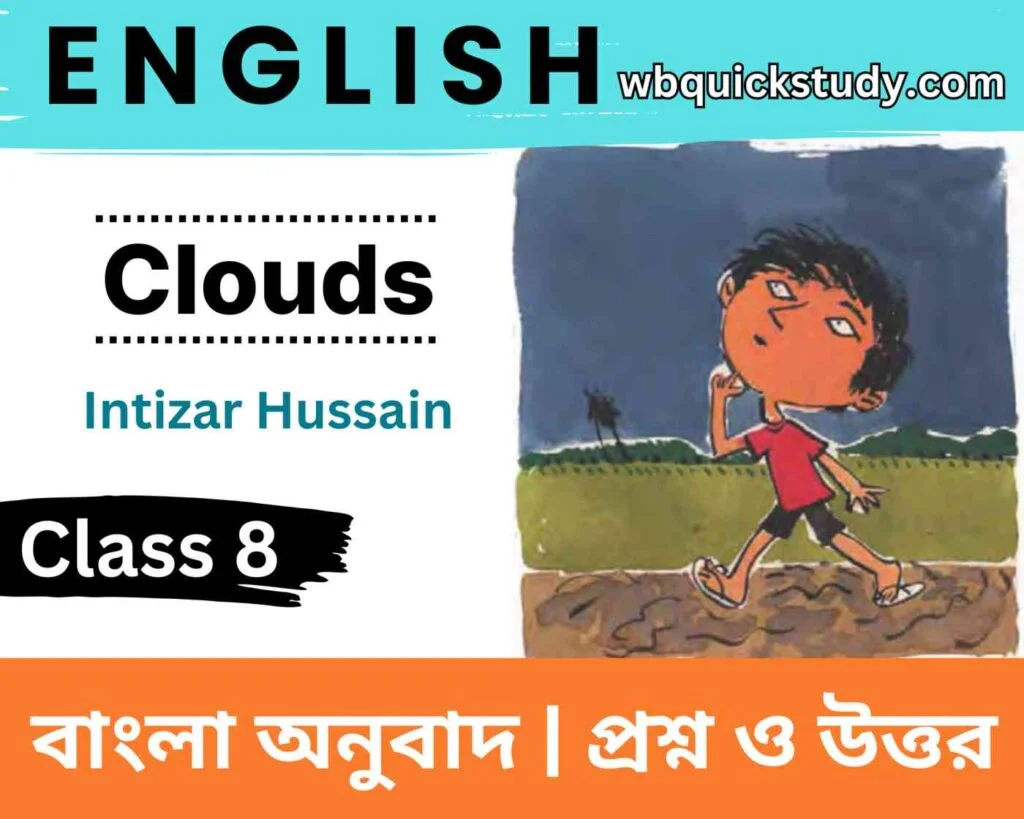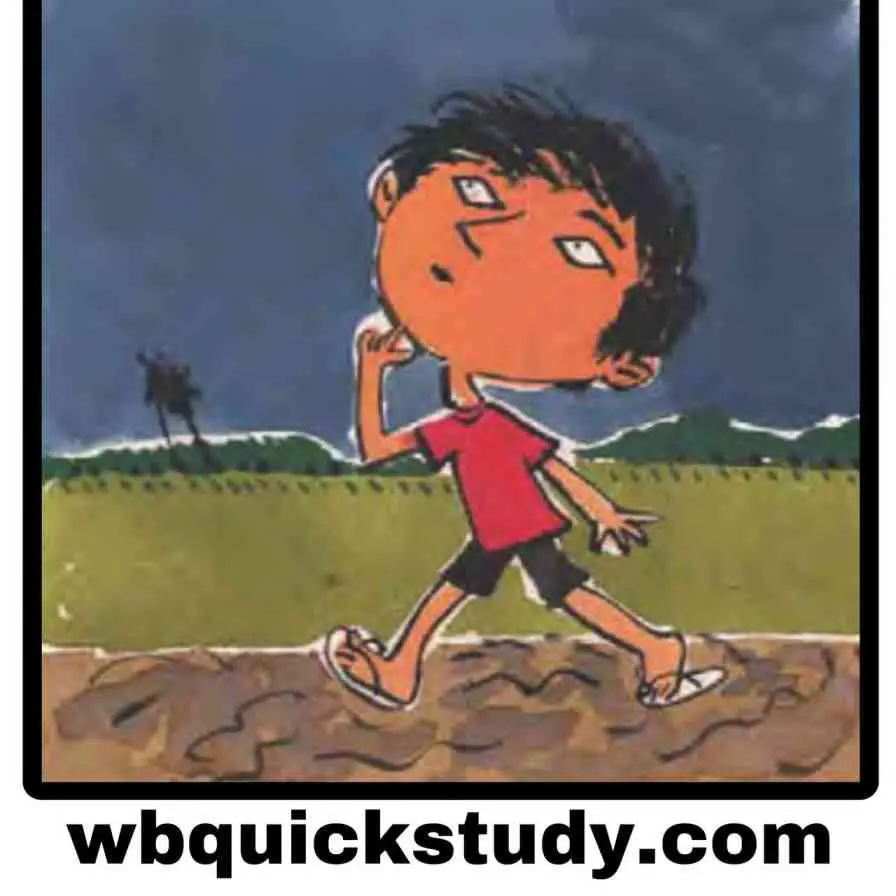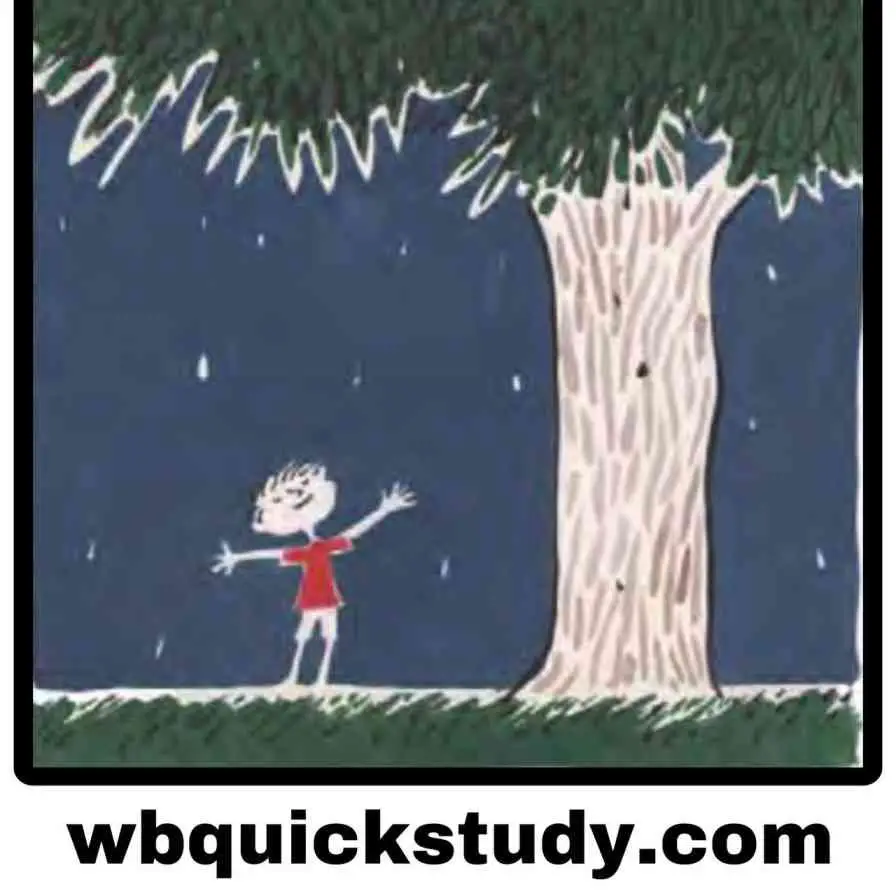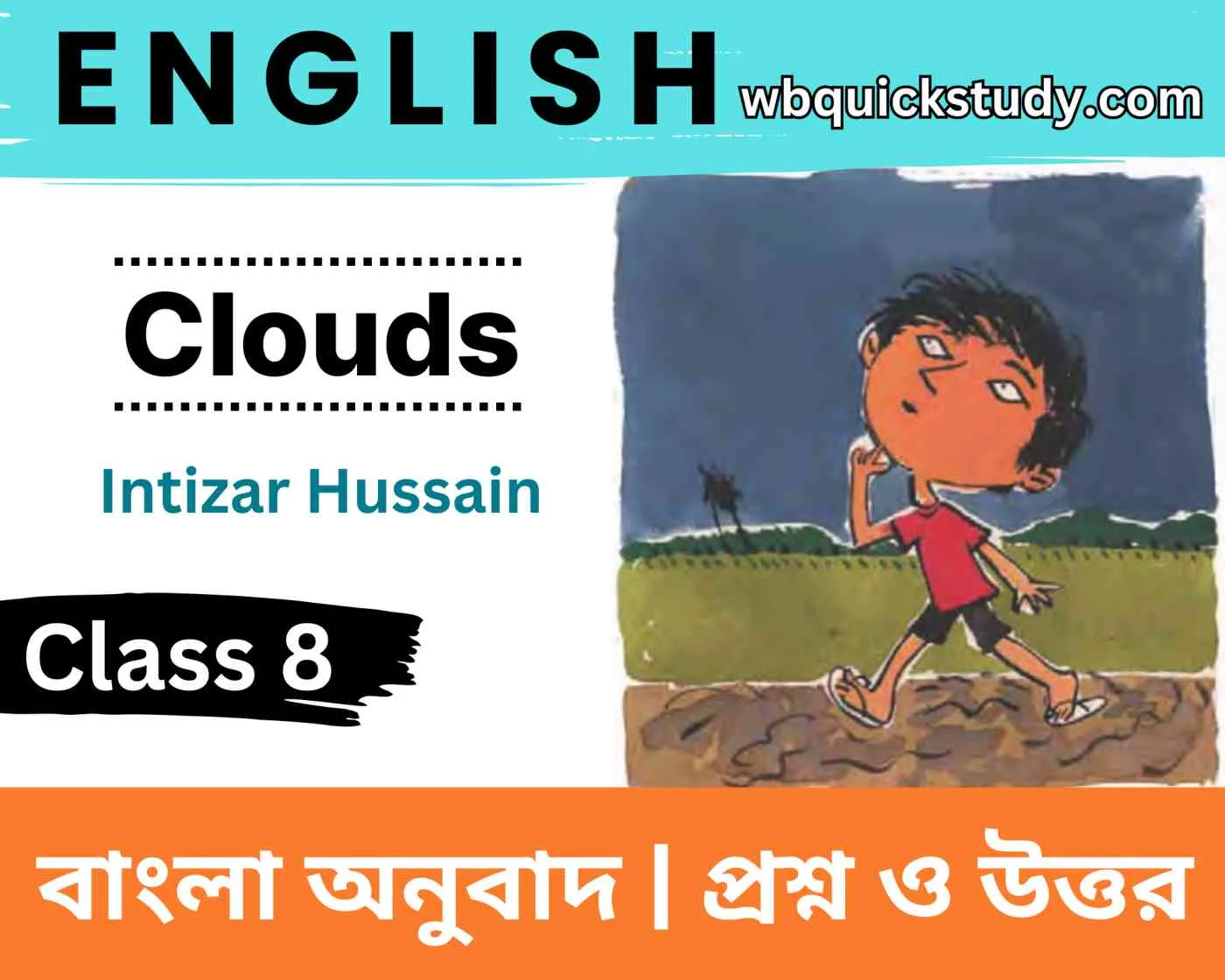Clouds | Intizar Hussain | Class 8 | English Bengali Meaning, Question, Answer | we will discuss in this article ‘Clouds’ from Class 8 English Textbook. Also we will discuss Clouds Class 8 English Bengali Meaning, Questions and Answers.
এই আর্টিকালে আমরা Class 8 English Textbook থেকে Clouds Class 8 English Bengali Meaning, Questions and Answers নিয়ে এসেছি ।

Lesson 2 ( Class VIII )
Clouds
Intizar Hussain
Author :-
Intizar Hussain (born in 1923)- is a famous writer from Pakistan who writes short stories and novels in Urdu, and also columns for newspapers in English. He has received many awards in Pakistan, India and the Middle East. The Seventh Door and Leaves are among his books translated into English. His Urdu short story Badal has been translated as Clouds by Rakshanda Jalil. The present text is its edited version.
বঙ্গানুবাদ :-
ইনতিজার হুসেন (যাঁর জন্ম ১৯২৩ খ্রিস্টাব্দে)- হলেন পাকিস্তানের একজন বিখ্যাত লেখক যিনি উর্দুতে ছোটোগল্প ও উপন্যাস এবং ইংরেজিতে খবরের কাগজের নিবন্ধ লেখেন। তিনি পাকিস্তান, ভারত এবং মধ্যপ্রাচ্যে প্রচুর পুরস্কার লাভ করেছেন। তাঁর ইংরেজিতে অনূদিত বইগুলির মধ্যে আছে ‘দ্য সেভেন্থ ডোর’ এবং ‘লীত্স’। তাঁর উর্দু ছোটোগল্প ‘বাদল’ রাক্সান্দা জলিল ‘ক্লাউড্স্’ নামে ইংরেজিতে অনুবাদ করেছেন। বর্তমান পাঠ্যাংশটি হল তারই সম্পাদিত সংস্করণ। ।
Let’s read :
He wandered far in search of the clouds, down winding paths and alleys, till he reached the old mud hut.
আঁকাবাঁকা পথ এবং অলিগলি ধরে সে মেঘেদের খোঁজে বহুদুর ঘুরে বেড়িয়েছিল যতক্ষণ না সে সেই পুরোনো মাটির কুঁড়েঘরে পৌঁছোল ।
There, he turned on to the dirt track.
সেখান থেকে সে কাঁচা রাস্তার দিকে ঘুরল ।
He saw a grass-cutter coming from the other direction, a bundle of freshly cut grass balanced on his head.
সে দেখল একজন ঘাসুড়ে অন্যদিক থেকে সদ্য কাটা ঘাসের একটা বোঝা তার মাথায় ভারসাম্য বজায় রেখে নিয়ে আসছে ।
He stopped the man and asked, “Have you seen the clouds there?”
সে ওই মানুষটাকে থামাল এবং জিজ্ঞেস করল, “তুমি কি মেঘেদের ওখানে দেখেছ?”
“Clouds?”
“মেঘেদের?”
The grass-cutter was amazed, as though he had been asked the most peculiar question.
ঘাসুড়ে খুব অবাক হল, যেন তাকে সবচেয়ে অদ্ভুত প্রশ্নটা করা হয়েছে ।
“Yes, clouds.”
“হ্যাঁ, মেঘেদের।”।
He was disappointed to see that the grass-cutter was still mystified.
ওই ঘাসুড়ে তখনও হতভম্ব হয়ে আছে দেখে সে হতাশ হল ।
He walked on until he came upon a farmer ploughing his field.
সে ততক্ষণ হাঁটল যতক্ষণ না সে একজন কৃষকের মুখোমুখি হল যে লাঙল দিয়ে জমি চাষ করছিল ।

He asked him the same question, “Did the clouds come here?”.
সে তাকে সেই একই প্রশ্ন জিজ্ঞেস করল, “মেঘেরা কি এখানে এসেছিল?”।
The farmer, too, couldn’t make sense of the question. “Clouds?” he asked.
কৃষকটিও প্রশ্নটির মানে বুঝতে পারল না। “মেঘেরা?” সে জিজ্ঞেস করল ।
“Yes, clouds.”.
“হ্যাঁ, মেঘেরা।”
He was asking after the clouds like a man who has lost a child and asks wayfarers if they have seen a child wandering.
সে মেঘেদের ব্যাপারে এমনভাবে খোঁজ করছিল যেন একজন ব্যক্তির একটি শিশু হারিয়ে গেছে এবং সে পথচারীদের জিজ্ঞেস করছে যে তারা শিশুটিকে ঘুরে বেড়াতে দেখেছে কি না।
Perhaps the clouds, too, were lost children and he was going around asking people about them.
হয়তো-বা মেঘেরাও হারিয়ে যাওয়া শিশুদের মতো এবং সে ঘুরে ঘুরে তাদের সম্পর্কে জিজ্ঞেস করছিল।
But no one could give him a satisfactory answer.
কিন্তু কেউ তাকে সন্তোষজনক উত্তর দিতে পারল না।
| Activity 1 |
● Rearrange the following sentences in the correct order and put the number in the given boxes : (নীচের বাক্যগুলিকে সঠিক ক্রম অনুসারে সাজাও এবং প্রদত্ত বাক্সগুলিতে তাদের ক্রমিক সংখ্যাগুলি লেখো) :
- He saw a grass-cutter coming from the other direction. [ সে একজন ঘাসুড়েকে অন্যদিক থেকে আসতে দেখেছিল। ]
- The grass-cutter was surprised. [ ঘাসুড়ে খুব অবাক হয়েছিল। ]
- He reached the old mud hut [ সে পুরোনো মাটির কুঁড়েঘরটিতে পৌঁছেছিল। ]
- He wandered in search of the clouds. [ সে মেঘের খোঁজে ঘুরে বেড়াতে লাগল। ]
- He asked the grass-cutter if he had noticed the clouds. [ সে ঘাসুড়েকে জিজ্ঞেস করেছিল সে মেঘেদের দেখেছে কি না। ]
- He turned onto the dirt track. [ সে কাঁচা রাস্তার দিকে ঘুরে গিয়েছিল। ]
Ans :- 1.-( iv ), 2.-( vi ), 3.-( ii ), 4.-( i ), 5.-( v ), 6.-( iii ) ||
| Activity 2 |
● Complete the following sentences with information the text : (পাঠ্যাংশ থেকে তথ্য নিয়ে নীচের বাক্যগুলি সম্পূর্ণ করো ) :
1. The grass-cutter had a bundle ____________________ .
Ans :- The grass-cutter had a bundle of freshly cut grass balanced on his head. [ ঘাসুড়ে তার মাথায় একটা সদ্য কাটা ঘাসের বোঝা নিয়ে ভারসাম্য রেখে চলছিল। ]
2. He was disappointed to see ____________________ .
Ans :- He was disappointed to see that the grass-cutter was still mystified. [ ঘাসুড়েকে তখনও হতভম্ব দেখে সে হতাশ হয়েছিল। ]
3. The farmer could not ____________________ .
Ans :- The farmer could not make sense of the boy’s question. [ কৃষক ছেলেটির প্রশ্ন বুঝতে পারেনি। ]
4. He was asking for the clouds like ____________________ .
Ans :- He was asking for the clouds like a man who has lost his child and asks wayfarers if they have seen a child wandering. [ সে মেঘেদের ব্যাপারে এমনভাবে জিজ্ঞেস করছিল যেন একজন ব্যক্তির কোনো শিশু হারিয়ে গেছে এবং সে পথচারীদের জিজ্ঞেস করছে যে তারা শিশুটিকে ঘুরে বেড়াতে দেখেছে কি না।। ]
| Activity 3 |
● Answer the following question : (নীচের প্রশ্নগুলির উত্তর দাও) :
1. “But no one could give him a satisfactory answer.” Why do you think no one could give him a satisfactory answer? [ তুমি কেন মনে কর কেউ তাকে একটি সন্তোষজনক উত্তর দিতে পারল না? ]
Ans :- None understood the boy’s question. Everyone might have wrongly thought that the clouds were human beings. It was because the boy was referring to the clouds as if he was looking for a lost child. [ কেউ ছোটো ছেলেটির প্রশ্ন বুঝে উঠতে পারেনি। প্রত্যেকে হয়তো ভুল করে মেঘেদের মানুষ মনে করেছে। এর কারণ ছেলেটি এমনভাবে মেঘেদের কথা বলছিল যেন সে একটি হারিয়ে যাওয়া শিশুর খোঁজ করছে । ]
Let’s continue :
His mother was the first he had asked in the morning, “Ammaji, where have the clouds gone?”
তার মা ছিলেন প্রথম ব্যক্তি যাঁকে সকালে সে জিজ্ঞেস করেছিল, “আম্মাজি, মেঘেরা কোথায় গেছে?”
“Who’s gone where?” Ammaji said, as if he had asked an exceptionally stupid question.
“কে, কোথায় গেছে?” আম্মাজি বললেন এমনভাবে যেন সে একটা অস্বাভাবিকরকম বোকা বোকা প্রশ্ন জিজ্ঞেস করেছে ।
“Clouds.”
“মেঘেরা।”
“Clouds! Have you lost your mind, boy? Hurry up, now. Wash quickly, eat your breakfast and go to school.”
“মেঘেরা! তোমার কি মাথা খারাপ হয়ে গেছে, খোকা? এখন তাড়াতাড়ি করো। তাড়াতাড়ি হাত-মুখ ধুয়ে নাও, জলখাবার খাও এবং স্কুলে যাও।”
Dejectedly, he washed his hands and face, ate his breakfast and left home.
হতাশ হয়ে সে হাত-মুখ ধুলো, জলখাবার খেয়ে নিল এবং বাড়ি থেকে বেরিয়ে পড়ল ।
But the question still haunted him: Where did the clouds go?
কিন্তু প্রশ্নটা তাকে তখনও তাড়া করে বেড়াচ্ছিল, “মেঘেরা কোথায় গেছে ?
He remembered what he had seen the night before-clouds gathering in the dark sky.
আগের দিন রাত্রে সে যা দেখেছিল তার মনে পড়ল-মেঘেরা অন্ধকার আকাশে জড়ো হচ্ছিল।
But when he went to sleep, the sky was clear and full of stars.
কিন্তু যখন সে শুতে গিয়েছিল তখন আকাশ ছিল পরিষ্কার এবং তারায় পরিপূর্ণ ।
When he awoke again, he had no idea of the time.
যখন সে আবার জেগে উঠেছিল, তখন তার সময়ের সম্বন্ধে কোনো ধারণা ছিল না।
All he knew was that it was the middle of the night.
সে শুধু এটাই জানত যে তখন ছিল মধ্যরাত্রি।
Up there in the sky, the clouds were rumbling.
ওপরে আকাশে মেঘেরা গুড়গুড় করছিল।
In the occasional flashes of lightning, they were dense and black.
মাঝে মাঝে বিদ্যুতের ঝলকানিতে বোঝা যাচ্ছিল ওগুলো ঘন ও কালো।
It looked as if it will be raining.
দেখে মনে হয়েছিল যেন বৃষ্টি হবে।
Rain will have ruined his sleep, he knew.
সে জানত যে বৃষ্টি তার ঘুমটাকে নষ্ট করে দেবে।
When he got up in the morning, he was amazed.
যখন সে সকালে ঘুম থেকে উঠল তখন সে খুব অবাক হয়ে গেল।
The sky was clear and empty! Not a trace of rain in the courtyard.
আকাশ ছিল পরিষ্কার এবং ফাঁকা! উঠোনে বৃষ্টির কোনো চিহ্ন ছিল না।
He was surprised and saddened-the clouds had moved across the skies without shedding a drop of rain.
সে অবাক ও দুঃখিত হল-মেঘেরা আকাশের একদিক থেকে অন্যদিকে চলে গেছে একফোঁটাও বৃষ্টি না ঝরিয়ে।
And it saddened him to think that he had fallen asleep.
এবং এটা ভেবে সে দুঃখিত হল যে সে ঘুমিয়ে পড়েছিল ।
Had he stayed awake, perhaps, the clouds would not have disappeared like that.
যদি সে জেগে থাকত, তাহলে হয়তো মেঘেরা ওইভাবে অদৃশ্য হয়ে যেত না ।
It would have been the season’s first rainfall.
এটা ওই ঋতুর প্রথম বৃষ্টিপাত হত ।
The month of the rains was slipping away.
বৃষ্টির মাস শেষ হয়ে আসছে।
He looked up once again at the skies.
সে আর-একবার আকাশের দিকে তাকাল।
Not a single patch of cloud.
এক টুকরো মেঘও নেই।
The sun beat down on his head from a clear sky.
পরিষ্কার আকাশ থেকে সূর্য তার মাথার ওপর উজ্জ্বলভাবে কিরণ দিচ্ছিল।
In the fierce heat, he walked between the fields.
প্রচন্ড তাপে সে মাঠের মধ্যে দিয়ে হাঁটতে লাগল।
His body was on fire, his throat dry.
তার গায়ে যেন আগুন জ্বলছিল এবং তার গলা শুকিয়ে আসছিল।
After crossing several fields, he saw a large tree in whose shade a Persian wheel turned gently.
কয়েকটা মাঠ পেরিয়ে যাওয়ার পরে, সে একটা বড়ো গাছ দেখতে পেল যার নীচে একটা জলচক্র আস্তে আস্তে ঘুরছিল।

It was like he had reached an oasis in the middle of a desert.
যেন মনে হচ্ছিল সে মরুভূমির মধ্যে একটি মরূদ্যানে এসে পৌঁছেছে।
He reached the shelter of the tree and splashed the cool water from the Persian wheel on his dusty feet.
সে গাছের আশ্রয়ে গিয়ে পৌঁছোল এবং তার ধুলোমাখা পায়ে জলচক্র থেকে ঠান্ডা জল ছিটিয়ে নিল।।
Then he washed his hands and face and drank his fill.
তারপর সে হাত-মুখ ধুলো এবং প্রাণভরে জলপান করল।
| Activity 4 |
● Write ‘T’ for true and ‘F’ for false statements in the given boxes. Give supporting statements for each of your answers : ( প্রদত্ত বাক্সগুলিতে সত্য বিবৃতির জন্য ‘T’ আর মিথ্যা বিবৃতির জন্য ‘F’ লেখো । তোমার প্রত্যেকটি উত্তরের সপক্ষে সমর্থনসূচক বিবৃতি দাও : )
(a) In the morning, the boy asked the first question to his father. [ সকালে ছেলেটি প্রথম প্রশ্নটি তার বাবাকে করেছিল । ]
Ans :- “F” ; S.S.- His mother was the first he had asked in the morning, “Ammaji, where have the clouds gone?”
(b) The boy’s mother asked him to go to school. [ ছেলেটির মা তাকে স্কুলে যেতে বলেছিলেন । ]
Ans :- “T” ; S.S.- “Wash quickly, eat your breakfast and go to school.”
(c) When the boy got up in the morning, he saw that the sky was cloudless. [ ছেলেটি যখন সকালে ঘুম থেকে উঠেছিল, তখন সে দেখেছিল আকাশ মেঘশূন্য। ]
Ans :- “T” ; S.S.- The sky was clear and empty.
(d) The boy was happy to think that he had fallen asleep. [ ছেলেটি এটা ভেবে খুশি হয়েছিল যে সে ঘুমিয়ে পড়েছিল । ]
Ans :- “F” ; S.S.- And it saddened him to think that he had fallen asleep.
| Activity 5 |
● Answer the following question : (নীচের প্রশ্নগুলির উত্তর দাও) :
1. Which question haunted the boy ? [ কোন্ প্রশ্নটি ছেলেটিকে তাড়া করে বেড়াচ্ছিল ? ]
Ans :- The question that haunted the boy was where the clouds had gone. [ যে প্রশ্নটি ছেলেটিকে তাড়া করে বেড়াচ্ছিল সেটি হল-মেঘেরা কোথায় গেছে । ]
2. What did the boy see in the middle of the night ? [ মধ্যরাত্রে ছেলেটি কী দেখেছিল ? ]
Ans :- In the middle of the night, the boy saw dense, black clouds in the occasional flashes of lightning. [ ছেলেটি মাঝে মাঝে বিদ্যুতের ঝলকানিতে আকাশে ঘন, কালো মেঘ দেখেছিল । ]
3. How did he feel as he walked between the fields ? [ যখন সে মাঠের মধ্যে দিয়ে হাঁটছিল তখন সে কেমন অনুভব করছিল? ]
Ans :- The boy felt that his body was on fire and his throat was dry in the fierce heat of the sun. [ ছেলেটির মনে হয়েছিল যে তার গায়ে যেন আগুন জ্বলছিল এবং সূর্যের প্রচণ্ড তাপে তার গলা শুকিয়ে গিয়েছিল। ]
4. What did he do after reaching the shelter of the tree ? [ গাছের আশ্রয়ে পৌঁছে যাওয়ার পর সে কী করেছিল ? ]
Ans :- The boy splashed the cool water from the Persian wheel on his dusty feet. He washed his hands and face, and drank to his satisfaction. [ ছেলেটি জলচক্র থেকে তার ধুলোমাখা পায়ে জল ছিটিয়ে নিয়েছিল। সে হাত-মুখ ধুয়েছিল এবং প্রাণভরে জলপান করেছিল । ]
Let’s continue :
Refreshed, he looked around.
চাঙ্গা হয়ে সে চারদিকে তাকাল।
An old man sat on a wall by the Persian wheel.
একজন বৃদ্ধ মানুষ ওই জলচক্রের পাশে একটি পাঁচিলের ওপর বসেছিলেন।
He looked at the old man, wanting to say something but hesitated.
ওই বৃদ্ধ মানুষটির দিকে সে তাকাল এবং কিছু বলতে চেয়ে সে ইতস্তত করল।
Finally he asked, “Did the clouds come here?”
শেষপর্যন্ত সে জিজ্ঞেস করল, “মেঘেরা কি এখানে এসেছিল?”
The old man looked closely at him and said, “Son, when the clouds come, the earth and the sky know of their coming.”
ওই বৃদ্ধ মানুষটি তাকে কাছ থেকে দেখলেন এবং বললেন, “শোনো বাবা, যখন মেঘেরা আসে, তখন পৃথিবী এবং আকাশ তাদের আগমন বার্তা জানে।”
“But the clouds were here last night and no one got to know.”
“কিন্তু মেঘেরা তো গত রাত্রে এখানেই ছিল এবং কেউই সেটা জানতে পারেনি।”
The old man said, “It is not enough for the clouds to come.
ওই বৃদ্ধ মানুষটি বললেন, “এটুকু মেঘেদের আসার জন্য যথেষ্ট নয়।
I once lived in a place where it hadn’t rained for ten years.”
আমি একটা জায়গায় বাস করতাম যেখানে দশ বছর কোনো বৃষ্টি হয়নি।”
“Ten years?” He was open-mouthed.
“দশ বছর?” সে হাঁ হয়ে গেল।
He sat there listening to his tales.
সে বসে বসে তার গল্প শুনছিল।
Suddenly, he realized how late it was.
হঠাৎ, সে বুঝতে পারল খুব দেরি হয়ে গেছে।
He walked for miles in the sun and dust.
সে সূর্যের তাপে আর ধুলোবালিতে বেশ কয়েক মাইল হাঁটল।
He went back by the same dirt track he had taken to come there.
সে ওই কাঁচা রাস্তা ধরেই ফিরে চলল যেটা ধরে সে এসেছিল।
The sun was still fiercely hot but when he reached the mud hut, he felt a nip in the air and the earth was damp underfoot.
সূর্যের তাপ তখনও প্রচণ্ড চড়া কিন্তু যখন সে ওই মাটির কুঁড়েঘরের কাছে পৌঁছোল, তখন সে বাতাসে একটা ঠান্ডার ভাব অনুভব করল এবং পায়ের নীচে মাটিটাও কিছুটা ভেজা ছিল।
As he neared his village, he saw the roads were wet.
সে যখন তার গ্রামের কাছাকাছি এল তখন সে দেখল যে রাস্তাগুলি ভেজা।
Trees that had been standing draped in layers of dust when he had left in the morning now looked freshly bathed.
সে সকালে রওনা দেওয়ার সময়ে যে গাছগুলি ধুলোর আস্তরণে ঢাকা পড়েছিল এখন তাদেরকে দেখে মনে হচ্ছিল তারা যেন সদ্যস্নাত।
He felt a wave of happiness.
সে খুশির তরঙ্গ অনুভব করল।
He hurried home.
সে দ্রুত বাড়ির দিকে চলল।
He wanted to see how fresh and clean the jamun tree in his courtyard looked.
সে দেখতে চাইল তাদের উঠোনের জাম গাছটাকে কীরকম তরতাজা এবং পরিষ্কার দেখাচ্ছে।
When he got home, he saw that the rain had changed everything.
যখন সে বাড়ি পৌঁছোল, তখন সে দেখল যে বৃষ্টি সব কিছুকে বদলে দিয়েছে।
The jamun tree stood clean and scrubbed, freshly showered, and Ammaji was saying,” That was a good shower, thank God!”
জাম গাছটাকে পরিষ্কার, ধোয়া-মোছা এবং সদ্যস্নাত দেখাচ্ছিল এবং আম্মাজি বলছিলেন, “বৃষ্টিটা বেশ ভালোই হল, ঈশ্বরকে ধন্যবাদ।”
Raindrops were still rolling off the leaves of the jamun.
বৃষ্টির জলের ফোঁটাগুলি তখনও জাম গাছের পাতা থেকে গড়িয়ে পড়ছিল।
He stood beneath the tree and let them fall on his head and face.
সে গাছটির নীচে দাঁড়াল এবং জলের ফোঁটাগুলিকে তার মাথায় ও মুখে পড়তে দিল।

He raised his eyes to the sky and saw it clear, without even a wisp of cloud.
সে চোখ তুলে আকাশের দিকে তাকাল এবং দেখল যে আকাশ পরিষ্কার-এক টুকরো মেঘও সেখানে নেই।
He had walked so far in the dust and sun in search of the clouds, and in his absence they had come, shed their rain and gone away!
সে মেঘেদের খোঁজে ধুলো এবং সূর্যের তাপে এতদূর হেঁটেছিল, আর তারা তার অনুপস্থিতিতে এল, বৃষ্টি ঝরাল এবং চলেও গেল।
| Activity 6 |
● Fill in the chart with information the text : ( পাঠ্যাংশ থেকে তথ্য নিয়ে নীচের ছকটি পূর্ণ করো : )
| Ans. | What | Why |
|---|---|---|
| 1. | The boy was open- mouthed. ( ছেলেটির মুখ হাঁ হয়ে গিয়েছিল। ) | The old man told the boy that he had once lived in a place where it had not rained for ten years. ( বৃদ্ধ মানুষটি ছেলেটিকে বলেছিলেন যে একসময় তিনি একটা জায়গায় বাস করতেন যেখানে দশ বছর কোনো বৃষ্টি হয়নি। ) |
| 2. | The earth was damp underfoot. ( পায়ের নীচে মাটি কিছুটা ভেজা ছিল। ) | It had rained hard a while ago. ( একটু আগেই প্রচণ্ড বৃষ্টি হয়ে গিয়েছিল। ) |
| 3. | The boy hurried home. ( ছেলেটি দ্রুত বাড়ির দিকে গিয়েছিল। ) | He wanted to see how fresh and clean the jamun tree in his courtyard looked. ( সে দেখতে চেয়েছিল তাদের উঠোনের জাম গাছটাকে কেমন পরিষ্কার ও তরতাজা লাগছে। ) |
| 4. | When he got home, he saw everything had changed. ( যখন সে বাড়ি পৌঁছোল, তখন সে দেখল সব কিছু বদলে গিয়েছে। ) | There had been a good shower during his absence. ( তার অনুপস্থিতিতে সেখানে ভালো বৃষ্টি হয়েছিল। ) |
| Activity 7 |
● Answer the following question : (নীচের প্রশ্নগুলির উত্তর দাও) :
1. What did the old man say about the place where he on lived ? [ বৃদ্ধ মানুষটি যে জায়গায় একসময় বাস করতেন ত সম্পর্কে কী বলেছিলেন ? ]
Ans :- The old man told the boy that he had once lived in place where it had not rained for ten years. [ বৃদ্ধ মানুষ ছেলেটিকে বলেছিলেন যে তিনি একসময় এমন এক জায়গায় ন করতেন যেখানে দশ বছর কোনো বৃষ্টি হয়নি। ]
2. How did the boy feel as he reached the mud-hut ? [ ছেলেটি কেমন অনুভব করেছিল যখন সে ওই মাটির কুঁড়েঘরে পৌঁছেছিল ? ]
Ans :- The boy felt a chill in the air and the damp earth underfoot. [ ছেলেটি বাতাসে ঠান্ডা ভাব ও পায়ের নীচে ভেজা মাটি অনুভব করেছিল । ]
3. What did the boy do as he stood under the jamun tree ? [ যখন ছেলেটি জাম গাছটির নীচে দাঁড়িয়েছিল তখন সে কী করেছিল। ]
Ans :- The boy let the raindrops fall on his head and face when he stood under the jamun tree. [ ছেলেটি যখন জাম গাছটির নীচে দাঁড়িয়েছিল তখন সে বৃষ্টির ফোঁটাগুলিকে তার মাথায় ও মুখে পড়তে দিয়েছিল । ]
4. Why did the clouds shed rain in the absence of the boy ? [ মেঘেরা কেন ছেলেটির অনুপস্থিতিতে বৃষ্টি ঝরিয়েছিল ? ]
Ans :- The boy walked far from his village in search of the clouds. The clouds in the meantime condensed and shed rain in the boy’s village. It happened naturally. But the author’s description suggests wish fulfilment of the boy. [ ছেলেটি মেঘের খোঁজে নিজের গ্রাম ছাড়িয়ে অনেক দূরে গিয়েছিল। মেঘেরা ইতিমধ্যে ঘনীভূত হয়ে ছেলেটির গ্রামে বৃষ্টি ঝরিয়েছিল। এটা খুব স্বাভাবিকভাবে ঘটেছিল। কিন্তু লেখকের বর্ণনায় এটি বালকের ইচ্ছা পূরণের কথা ইঙ্গিত করে । ]
| Activity 8 (a) |
● Underline the verbs that denote actions which will be in progress at a time in the future: ( সেইসব verb-গুলির নীচে দাগ দাও যেগুলি ভবিষ্যতে কোনো একটা সময়ে ঘটতে থাকবে এমন কাজকে বোঝাচ্ছে: )
(i) I shall be reading a book next week. [ আমি পরের সপ্তাহে একটি বই পড়তে থাকব। ]
(ii) You will be going to school tomorrow. [ আগামীকাল তুমি বিদ্যালয়ে যেতে থাকবে। ]
(iii) They will be visiting our house next month. [ পরের মাসে তারা আমাদের বাড়িতে আসতে থাকবে। ]
The verbs you have underlined are in the Future Continuous Tense. [ যে verb-গুলির নীচে দাগ দিয়েছ সেইগুলিকে বলে Future Continuous Tense ]
A Future Continuous Tense is a form of a verb that denotes an action which will be in progress at a time in the future. [ Future Continuous Tense হল verb-এর এমন একটি রূপ যা ভবিষ্যতে কোনো একটি সময়ে চলতে থাকবে এরকম কাজকে বোঝায় ।
| Activity 8 (b) |
● Underline the verbs that denote actions that will be completed in the future: ( সেইসব verb-গুলির নীচে দাগ দাও যেগুলি ভবিষ্যতে কোনো একটি সময়ে শেষ হবে এমন কাজকে বোঝায় )
(i) I shall have written the story by then. [ সেই সময়ের মধ্যে আমি গল্পটি লিখে ফেলব। ]
(ii) He will have left before you go to see the doctor. [ তুমি ডাক্তার দেখাতে যাবার আগেই সে চলে যাবে। ]
(iii) You shall have gone to the fair. [ তুমি মেলায় চলে যাবে। ]
The verbs you have underlined are in the Future Perfect Tense. [ যে verb-গুলির তলায় দাগ দিয়েছ সেইগুলি Future Perfect Tense-এ আছে। ]
A Future Perfect Tense is a form of a verb that denotes an action that will be completed by a cerrain time in the future. [ Future Perfect Tense হল verb-এর এমন একটি রূপ যা ভবিষ্যতে কোনো একটি সময়ের মধ্যে শেষ হবে এমন একটি কাজকে বোঝায় ।
| Activity 8 (c) |
● Read the following sentences. Identify the future continuous tense and future perfect tense and fill in the table given below : ( নীচের বাক্যগুলি পড়ো। Future Continuous Tense এবং Future Perfect Tense- গুলিকে চিহ্নিত করো এবং নীচের সারণিটি পূর্ণ করো: )
(i) I shall be playing in the field. [ আমি মাঠে খেলতে থাকব। ]
(ii) She will have recited the poem. [ সে কবিতাটি আবৃত্তি করে ফেলবে। ]
(iii) You will have enjoyed the picnic. [ তুমি বনভোজনটি উপভোগ করে ফেলবে । ]]
(iv) They will be coming soon.. [ তারা খুব শীঘ্রই আসতে থাকবে। ]
| Ans. | Future Continuous Tense | * | Future Perfect Tense |
|---|---|---|---|
| 1. | I shall be playing in the field. | 2. | She will have recited the poem. |
| 4. | They will be coming soon. | 3. | You will have enjoyed the picnic. |
| Activity 9 |
● Write the antonyms of the underlined words by using the prefixes from the Help Box : (সাহায্যকারী বাক্স থেকে prefix-গুলি ব্যবহার করে নিম্নলিখিত শব্দগুলির বিপরীতার্থক শব্দ লেখো ) :
1. It is possible for him to lift the chair. [ চেয়ারটি তোলা তার পক্ষে সম্ভব। ]
Ans :- impossible [ অসম্ভব ]
2. His handwriting is legible. [ তার হাতের লেখা সহজবোধ্য। ]
Ans :- illegible [ দুর্বোধ্য ]
3. Their claim is not reasonable. [ তাদের দাবিটি যুক্তিগ্রাহ্য নয়। ]
Ans :- unreasonable [ অযৌক্তিক ]
4. He believes his friend. [ সে তার বন্ধুকে বিশ্বাস করে। ]
Ans :- disbelieyes [ অবিশ্বাস ]
Help Box :- dis-, un-, im-, il-.
| Activity 10 a |
● “Write a story in about eighty words using the following hints : (নীচের সংকেতগুলি ব্যাবহার করে কমবেশি আশিটি শব্দের মধ্যে একটি গল্প লেখো ) :
Hints :- two friends passing through a forest-a bear came-one friend climbed a tree-the other friend could not climb the tre helpless-lay down like a dead man-bear came near the man-thought he was dead-went away
Ans :-
Two Friends and a Beer
Two bosom friends were passing through a forest. Wild animals abounded in that forest. The friends were very afraid. As they hurried on, a bear appeared in front of them. One friend climbed up a tree quickly. But the other friend could not climb a tree. He felt helpless. Suddenly he had an idea. He lay down like a dead man. He knew that bears do not touch dead men. The bear came near him and sniffed him hard. It thought him to be dead and went away. The other friend came down from the tree. He said to his friend, “I think the bear was telling you something. What was it?” The other friend smiled and said, “Don’t believe a friend who leaves you in danger.”
দুই বন্ধু ও ভালুক
দুই ঘনিষ্ঠ বন্ধু বনের মধ্য দিয়ে যাচ্ছিল। ওই বন ছিল বন্য জন্ধুতে পরিপূর্ণ। দুই বন্ধু খুব ভয় পেয়েছিল। যখন তারা তাড়াহুড়ো করে যাচ্ছে, এমন সময় একটা ভালুক তাদের সামনে এসে পড়ল। একজন বন্ধু খুব দ্রুত একটি গাছে উঠে গেল। কিন্তু অন্য বন্ধু গাছে উঠতে জানত না। সে অসহায় বোধ করল। হঠাৎ-ই তার মাথায় একটা বুদ্ধি এল। সে মৃত মানুষের মতো শুয়ে পড়ল। সে জানত ভালুক কখনও মৃত মানুষ স্পর্শ করে না। ভালুক তার কাছে এল আর বেশ ভালোভাবে তাকে শুকল। তাকে মৃত ভেবে সে চলে গেল। অন্য বন্ধু গাছ থেকে নামল। সে তার বন্ধুকে জিজ্ঞেস করল, “মনে হল ভালুক তোমাকে কিছু একটা বলছিল। কী বলছিল?” অন্য বন্ধু হেসে বলল, “যে বন্ধু তোমাকে বিপদে ফেলে চলে যায় তাকে বিশ্বাস কোরো না।”
| Activity 10 b |
● Suppose you have been waiting for a piece of good news. Write a paragraph in about eighty words on your experience of waiting : (ধরে নাও তুমি একটি ভালো খবরের জন্য অপেক্ষা করছ। তোমার অপেক্ষার অভিজ্ঞতার কথা বর্ণনা করে কমবেশি আশিটি শব্দের মধ্যে একটি অনুচ্ছেদ রচনা করো ) :
Hints :- the news you waited for-what you did while waiting-whether the news had come-your feelings.
Ans :-
A Rewarding Wait
My elder brother sat for Madhyamik Examination this year. Teachers of our school expected that he would secure a good result. My parents were excited. I was also agog because I would sit for the same examination after two years. I was very tense when my brother went to school to receive his result. I was anxiously waiting for the good news. At noon, my brother finally came and announced that he had obtained good marks in that examination. The good news was a great relief and inspiration to me.
একটি ফলপ্রসূ অপেক্ষা
আমার দাদা এই বছর মাধ্যমিক পরীক্ষায় বসেছিল। আমাদের স্কুলের শিক্ষকরা প্রত্যাশা করেছিলেন যে সে ভালো ফলাফল করবে। আমার বাবা-মাও খুব উত্তেজিত ছিলেন। আমিও উত্তেজনায় অস্থির হয়ে ছিলাম কারণ দু-বছর পর আমিও একই পরীক্ষায় বসব। আমার দাদা যখন স্কুলে গিয়েছিল তার ফলাফল জানার জন্য আমিও খুব উত্তেজিত ছিলাম। আমি উৎকণ্ঠার সঙ্গে ভালো খবরের জন্য অপেক্ষা করছিলাম। দুপুরে আমার দাদা এসে জানাল যে পরীক্ষায় সে ভালো ফল করেছে। ওই ভালো খবর আমার কাছে স্বস্তির ও অনুপ্রেরণাদায়ী ছিল।

